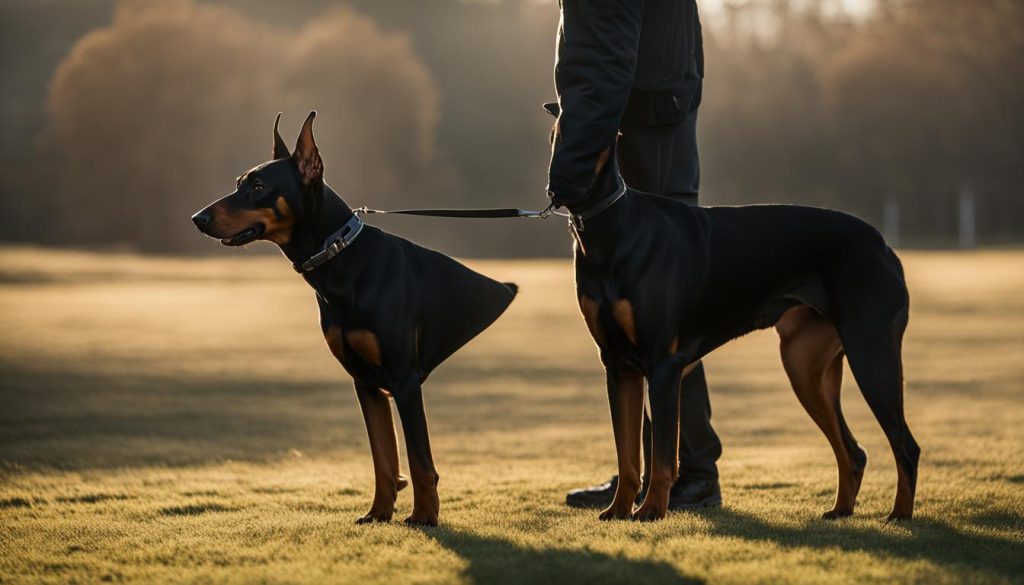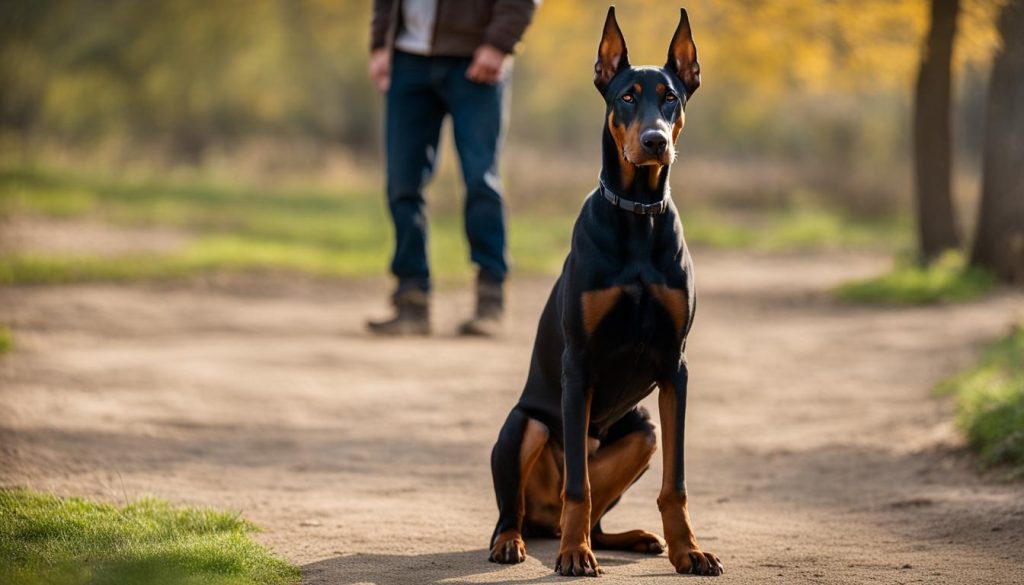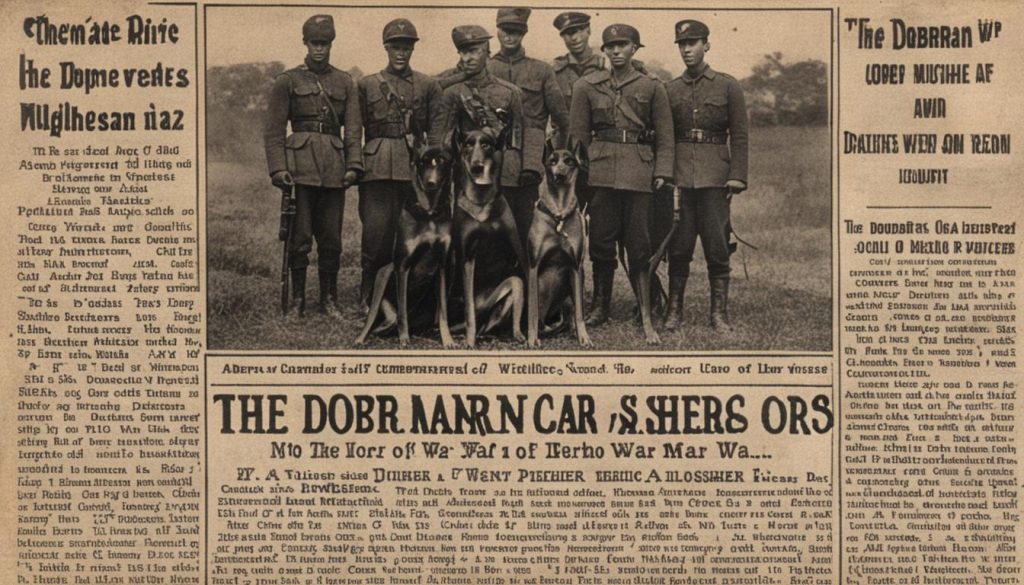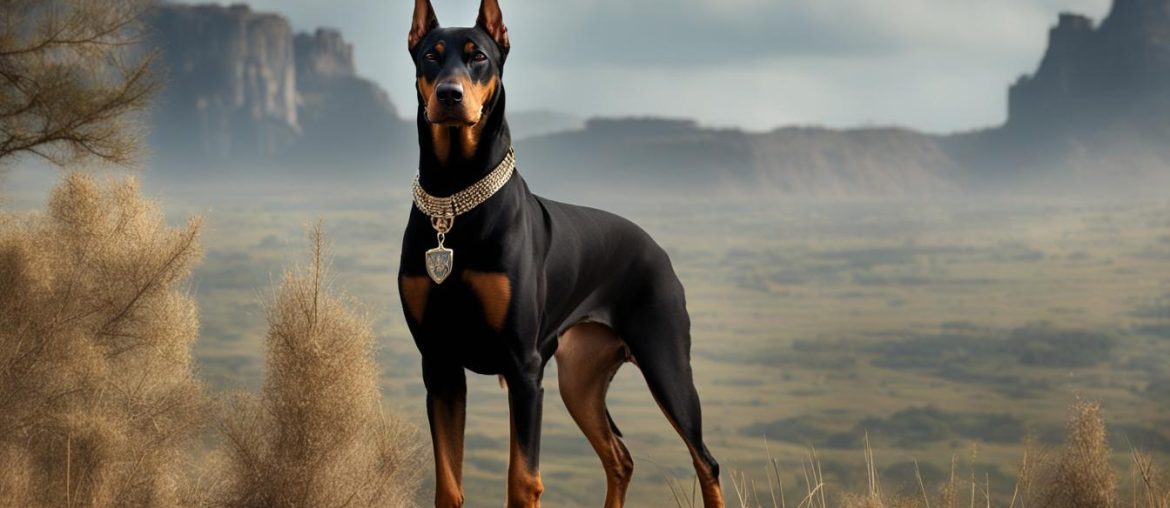Welcome to our article on the Doberman Pinscher! If you are considering adding a Doberman to your family, it’s important to understand their personality and traits. Known for their loyalty and protective nature, Dobermans can be loving and affectionate companions when properly socialized and trained. In this section, we will explore the various aspects of the Doberman Pinscher’s personality, including their temperament, behavior, and disposition.
Dobermans require careful socialization and obedience training to ensure they develop into well-rounded dogs. Their intelligence and responsiveness to positive reinforcement make them highly trainable. Additionally, understanding their temperament with children and other dogs is crucial when considering them as a family pet. To assess their temperament, some owners opt for temperament testing.
Key Takeaways:
- The Doberman Pinscher is known for its loyalty and protective nature.
- Proper socialization and training are crucial for a well-behaved Doberman.
- Dobermans exhibit intelligence and respond well to positive reinforcement.
- Understanding their temperament with children and other dogs is important.
- Temperament testing can help assess a Doberman’s behavior and suitability.
Doberman Pinscher Size and Weight

The size and weight of a Doberman Pinscher play an important role in understanding this breed’s physical characteristics. Male Dobermans typically measure around 27 or 28 inches in height and weigh about 70 pounds. Females, on the other hand, are slightly shorter, measuring an inch or two less in height, and typically weigh around 60 to 65 pounds.
These measurements give Doberman Pinschers their distinctively sleek and muscular appearance. Their size contributes to their ability to protect and guard their families, as well as their agility and athleticism. It is important to consider these factors when considering whether a Doberman Pinscher is the right dog for you.
Doberman Pinscher Coat and Colors

The Doberman Pinscher has a short, smooth coat that is easy to groom. Their coat is dense and close-fitting, providing them with adequate protection in various weather conditions. This breed has a range of colors, including black, red, blue, and fawn. These colors are often accompanied by tan markings on specific areas of their bodies, such as the muzzle, chest, and legs. Another color variation is the light tan shade known as “Isabella,” which also features rust markings.
“The Doberman Pinscher has a sleek coat that requires minimal grooming. Their coat colors can range from black to red, blue, and fawn, all with tan markings. The Isabella variation, with its light tan coloration and rust markings, is another unique option.”
The Doberman Pinscher’s coat color is determined by genetic factors. Responsible breeders carefully select their breeding pairs to ensure a desirable coat color and markings. However, coat color does not affect the breed’s temperament, health, or overall quality. When choosing a Doberman Pinscher, it’s essential to focus on their personality, health, and suitability for your lifestyle, rather than solely considering coat color.
Coat Care Tips
- Regular brushing: Use a soft-bristle brush or grooming mitt to remove loose hair and keep the coat looking sleek.
- Bathing as needed: Doberman Pinschers have a clean and odor-free coat, so they typically require bathing only when necessary.
- Nail trimming: Keep their nails trimmed to a moderate length to avoid discomfort or injury.
- Dental hygiene: Regular teeth brushing and dental care can help maintain good oral health.
By providing proper coat care, you can help your Doberman Pinscher look and feel their best. Regular grooming sessions also provide an opportunity for bonding and building trust with your canine companion.
Doberman Pinscher Traits and Care

When considering a Doberman Pinscher as a pet, it’s essential to understand their unique traits and care requirements. This breed is known for its intelligence, loyalty, and protective nature. Dobermans are moderate barkers and have moderate grooming and social needs. They thrive in environments where they receive plenty of mental and physical stimulation due to their high energy levels. To ensure the well-being of a Doberman Pinscher, proper care and attention are necessary.
Traits:
- Intelligence: Doberman Pinschers are highly intelligent dogs that are quick learners. They respond well to positive reinforcement training methods and enjoy mental challenges.
- Loyalty: Dobermans form strong bonds with their families and are fiercely loyal. They are known to be protective of their loved ones.
- Alertness: With their natural instincts and watchful nature, Dobermans make excellent watchdogs. They have a keen sense of awareness and can evaluate potential threats.
- Energy: Dobermans are energetic dogs that require regular exercise to prevent boredom and destructive behaviors. They thrive in environments that provide them with ample opportunities for physical activity.
Care:
Proper care for a Doberman Pinscher involves meeting their physical and mental needs. Regular exercise, at least 40 minutes per day, is essential to keep them mentally and physically stimulated. This can include activities such as long walks, runs, or engaging in interactive play. Additionally, their short, smooth coat requires minimal grooming. Regular brushing is sufficient to keep their coat in good condition. It’s also important to provide them with a balanced diet, regular veterinary check-ups, and maintain their overall health and well-being.
| Traits | Care |
|---|---|
| Intelligence | Regular exercise |
| Loyalty | Proper grooming |
| Alertness | Balanced diet |
| Energy | Regular veterinary check-ups |
“Dobermans are highly intelligent dogs that are quick learners and enjoy mental challenges.”
Doberman Pinscher Temperament

The temperament of Doberman Pinschers is known to be intelligent, loyal, and alert. These qualities make them excellent companions and family pets. However, it is important to remember that each dog is an individual, and their temperament can vary. While most Dobermans are friendly and affectionate with their families, some may be reserved or suspicious around strangers if not properly socialized.
To assess a Doberman Pinscher’s behavior and suitability for different environments, temperament testing can be conducted. This testing evaluates their response to various stimuli, including interactions with people and other animals. It helps potential owners understand a Doberman’s temperament and make informed decisions about their compatibility.
Proper socialization plays a crucial role in shaping a Doberman’s temperament. Early exposure to different people, animals, and environments helps them develop appropriate behavior and confidence. Obedience training also contributes to their temperament by establishing clear boundaries and expectations. Positive reinforcement training methods work best with Dobermans, as they respond well to rewards and praise.
| Traits | Characteristics |
|---|---|
| Intelligence | Doberman Pinschers are highly intelligent dogs and can quickly learn and respond to commands. They are known for their problem-solving abilities and can be trained for various tasks. |
| Loyalty | Dobermans are fiercely loyal to their families and form strong bonds with their owners. They are protective of their loved ones and will go to great lengths to keep them safe. |
| Alertness | Dobermans have a keen sense of alertness and are naturally protective. They are quick to detect potential threats and will bark to alert their family. It makes them excellent watchdogs. |
Common Temperament Challenges
- Aggression: Some Dobermans may display aggression towards unfamiliar people or animals if not properly socialized or trained. This behavior can be managed through early socialization, obedience training, and positive reinforcement techniques.
- Suspicion: Dobermans can be wary of strangers and may take time to warm up to new people. It is important to expose them to various social situations and provide positive experiences to build their trust and confidence.
- Protectiveness: Dobermans are naturally protective of their families, which can sometimes manifest as overprotectiveness. It is essential to teach them appropriate boundaries and ensure they are exposed to different environments and individuals from an early age.
Doberman Pinschers are known for their intelligence, loyalty, and alertness. They are protective of their families and can be reserved around strangers if not properly socialized.
Understanding and addressing the temperament of a Doberman Pinscher is important for their well-being and the well-being of those around them. By providing early socialization, positive reinforcement training, and a loving environment, Dobermans can thrive as loving and loyal companions.
Doberman Pinscher History

The Doberman Pinscher breed has a fascinating history that traces back to the late 1800s in Germany. Louis Dobermann, a tax collector from the town of Apolda, desired a loyal and protective companion to accompany him during his rounds. To achieve this, he embarked on a breeding program, carefully selecting and crossing various breeds to create what would become known as the Doberman Pinscher.
Mr. Dobermann’s breeding program included the Rottweiler, German Pinscher, Great Dane, German Shepherd Dog, Manchester Terrier, and English Greyhound Shorthaired Shepherd. By combining these breeds, he aimed to develop a dog with exceptional loyalty, intelligence, and protective instincts. The result was the Doberman Pinscher, a breed with a striking appearance and a strong drive to serve and protect.
The Doberman Pinscher quickly caught the attention of dog enthusiasts and soon found roles beyond just being a loyal companion. During World War I and World War II, Dobermans served as military dogs, performing various tasks such as guarding, message delivery, and search and rescue missions. They also demonstrated their bravery and dedication as police dogs, working alongside law enforcement officers.
| Year | Event |
|---|---|
| 1890 | The breed is officially recognized as the “Dobermann Pinscher” in honor of Louis Dobermann. |
| 1900s | Dobermans gain popularity as guardian and working dogs. |
| World War I | Dobermans serve in the military, performing various tasks. |
| World War II | Dobermans continue to serve in the military and demonstrate their loyalty and bravery. |
| Post-War Era | Dobermans become popular as police and search and rescue dogs. |
Today, Doberman Pinschers are beloved companions for families around the world. Their intelligence, loyalty, and protective nature make them excellent family dogs when properly trained and socialized. While they still retain their working dog traits, they are also known for their gentle and affectionate nature towards their human family members.
Overall, the history of the Doberman Pinscher reflects a breed that was meticulously developed to possess the ideal combination of loyalty, intelligence, and protective instincts. From their humble beginnings as a tax collector’s companion to their roles as military and police dogs, Dobermans have proven themselves to be remarkable and versatile canines.
Training and Socialization for Doberman Pinschers

Training and socialization are crucial for Doberman Pinschers. These intelligent and loyal dogs respond well to positive reinforcement and can be easily trained. Early socialization is essential to help them develop appropriate behavior around strangers, other dogs, and different environments. Obedience training should start from a young age to establish a strong bond and ensure good behavior.
When it comes to training Doberman Pinschers, it is important to focus on positive reinforcement techniques such as rewards and praise. They are highly motivated to please their owners and thrive in an environment where they receive consistent and positive training. Harsh or negative training methods can lead to fear or aggression in Dobermans, so it’s best to avoid such approaches.
In addition to obedience training, Doberman Pinschers can benefit from specialized training activities such as agility, tracking, or even therapy dog training. These activities not only provide mental and physical stimulation but also strengthen the bond between the dog and its owner.
Socialization for Doberman Pinschers
Socialization plays a crucial role in shaping a Doberman Pinscher’s behavior and temperament. Early and ongoing socialization helps them become well-rounded dogs that are confident and comfortable in various situations. Introduce your Doberman puppy to different people, animals, sounds, and environments to help them become accustomed to new experiences.
“Proper socialization from an early age is vital for Doberman Pinschers to develop into well-behaved and balanced dogs.” – Professional Dog Trainer
Expose your Doberman Pinscher to different environments, such as parks, city streets, and crowded areas, to help them become comfortable with various stimuli. Gradual exposure to new situations and positive reinforcement can help them overcome any fear or anxiety they may have.
| Training Tips for Doberman Pinschers | Socialization Tips for Doberman Pinschers |
|---|---|
|
|
By providing proper training and socialization, you can ensure that your Doberman Pinscher becomes a well-behaved and balanced companion that you can enjoy for years to come.
Doberman Pinscher as Family Pets

Doberman Pinschers, despite their reputation as guard dogs, can make loving and loyal family pets. When raised with children and other pets, they can be protective and form strong bonds with their family members. However, careful supervision and proper socialization are essential to ensure they get along well with children and other animals.
These intelligent and alert dogs are known for their loyalty and can be excellent companions for active families. With their high energy levels, they require regular exercise and mental stimulation. Daily walks, playtime, and interactive toys can help keep them physically and mentally engaged.
Please be aware that Doberman Pinschers thrive on positive reinforcement and consistent training. Early socialization and obedience training are crucial to help them develop good behavior and manners. When given proper guidance, Dobermans can be well-behaved and obedient members of the family.
Doberman Pinscher Health Concerns
When considering adding a Doberman Pinscher to your family, it’s important to be aware of the potential health concerns that can affect this breed. Although generally a healthy breed, Dobermans are prone to certain genetic conditions that owners should be vigilant about. Regular veterinary check-ups and responsible breeding practices can help ensure the overall health and well-being of these loyal companions.
One of the most common health concerns in Doberman Pinschers is cardiomyopathy, which is characterized by an enlarged heart. This condition can lead to heart failure and can be life-threatening if not detected and managed early on. It is crucial for Doberman owners to have their dogs screened for this condition regularly.
Another health issue that can affect Dobermans is cervical vertebral instability, also known as Wobbler’s syndrome. This condition is caused by the compression of the spinal cord in the neck region, resulting in a wobbly gait, weakness, and difficulty coordinating movements. Proper diagnosis and treatment are essential in managing Wobbler’s syndrome and improving the quality of life for affected dogs.
| Health Concern | Description |
|---|---|
| Cardiomyopathy | An enlarged heart that can lead to heart failure if not managed. |
| Cervical Vertebral Instability (Wobbler’s Syndrome) | Compression of the spinal cord in the neck region, resulting in a wobbly gait and weakness. |
Von Willebrand’s disease is another health concern in Dobermans. It is a bleeding disorder that affects the dog’s ability to form blood clots, leading to excessive bleeding even from minor injuries. Responsible breeders will screen their dogs for this condition to ensure that it is not passed on to future generations.
Lastly, Dobermans can also be prone to Addison’s disease, which is a dysfunction of the adrenal glands. This condition affects the production of hormones that are essential for the body’s normal functioning. Early detection and proper treatment can help manage this condition and ensure a good quality of life for affected dogs.
By being aware of these potential health concerns and working closely with reputable breeders and veterinarians, Doberman owners can take the necessary steps to keep their beloved pets healthy and happy for years to come.
Doberman Pinscher as Watchdogs
The Doberman Pinscher’s innate qualities make them exceptional watchdogs. Their intelligence, loyalty, and protective nature equip them with the ability to anticipate danger and evaluate potential threats. With their natural instincts and keen senses, they are vigilant in safeguarding their families and property. Specialized guard training is not necessary as their inherent traits are typically sufficient to fulfill their watchdog role.
When it comes to protecting their loved ones, Doberman Pinschers are known for their devotion and courage. They form strong bonds with their families and will go to great lengths to ensure their safety. Their alertness and quick responses make them reliable in perceiving and alerting their owners of any potential risks.
Doberman Pinschers are not only watchful; they are also highly perceptive. They possess the ability to gauge situations and individuals, making them a valuable asset in maintaining security. Their imposing presence combined with their innate protective instincts often serve as a deterrent to potential intruders.
In summary, Doberman Pinschers excel in the role of watchdogs due to their intelligence, loyalty, and natural protective instincts. Their ability to anticipate danger, evaluate threats, and respond swiftly make them an ideal choice for those seeking a dependable and vigilant four-legged guardian.
Proper Care and Grooming for Doberman Pinschers
When it comes to caring for a Doberman Pinscher, regular grooming and proper care are essential to ensure their overall well-being. Fortunately, Dobermans have low grooming needs due to their short, smooth coats. A simple regular brushing routine will help keep their coat in good condition and minimize shedding. Additionally, bathing should only be done as needed to avoid drying out their skin.
Aside from grooming, exercise is crucial for Dobermans to keep them mentally and physically stimulated. They are an energetic breed that requires at least 40 minutes of exercise per day. This can include brisk walks, jogging, or playing fetch in a securely fenced area.
Another important aspect of caring for a Doberman Pinscher is regular nail trimming. Overgrown nails can be uncomfortable for your furry friend and may cause issues with their gait. If you are uncomfortable trimming their nails yourself, it is best to seek professional help from a veterinarian or a certified dog groomer.
Table: Doberman Pinscher Care and Grooming Checklist
| Care and Grooming Tasks | Frequency |
|---|---|
| Brushing | At least once a week |
| Bathing | As needed |
| Exercise | At least 40 minutes per day |
| Nail trimming | Every 2-3 weeks or as needed |
| Ear cleaning | Once a month |
| Teeth brushing | At least 2-3 times a week |
In addition to these basic grooming tasks, it is essential to regularly clean your Doberman Pinscher’s ears and brush their teeth to maintain their overall health. Ear cleaning should be done once a month to prevent any buildup of wax or debris, which can lead to ear infections. Brushing your Doberman’s teeth at least 2-3 times a week is important to prevent dental issues, such as gum disease or tooth decay.
By following these care and grooming guidelines, you can ensure that your Doberman Pinscher remains healthy, happy, and looking their best!
Wrapping Up
After exploring the Doberman Pinscher breed, it is evident that their personality, breed traits, temperament, history, and care make them an exceptional choice for the right owner. With their loyalty, intelligence, and protective nature, Doberman Pinschers can become cherished companions for individuals or families who are willing to invest the time and effort into their training, socialization, exercise, and care.
Properly raised and socialized Dobermans are known to be affectionate and sweet with their families, displaying a close bond and unwavering loyalty. However, it is essential to understand the breed’s need for mental and physical stimulation along with their protective instincts. Providing regular exercise and engaging activities will help keep them mentally and physically satisfied.
Responsible breeding practices, health screenings, and regular veterinary care are crucial in maintaining the overall health and well-being of Doberman Pinschers. By prioritizing these aspects, owners can ensure their beloved companions lead happy and healthy lives. Knowing the Doberman Pinscher’s history, along with their specific care requirements, owners can be better prepared to meet the breed’s needs and provide an optimal environment for them to thrive.
FAQ
What is the personality of a Doberman Pinscher?
Doberman Pinschers are known for their loyalty, intelligence, and protective nature. They can be affectionate and sweet with people, particularly their families.
How big do Doberman Pinschers get?
Male Doberman Pinschers typically measure around 27 or 28 inches in height and weigh about 70 pounds. Females are slightly shorter, measuring an inch or two less in height, and typically weigh around 60 to 65 pounds.
What are the different coat colors of Doberman Pinschers?
Doberman Pinschers come in various colors, including black, red, blue, and fawn, all with tan markings. There is also a light tan color known as “Isabella” with rust markings. White or cream Dobermans, although marketed as rare and prized, are associated with severe health problems and should be avoided.
What are some common traits of Doberman Pinschers?
Doberman Pinschers are moderate barkers with moderate grooming needs, moderate social needs, and high energy levels.
What is the temperament of a Doberman Pinscher?
Doberman Pinschers are known for their intelligence, loyalty, and alertness. They can be protective of their families and may show aggression towards unfamiliar people or animals if not properly socialized.
Who developed the Doberman Pinscher breed?
The Doberman Pinscher breed was developed by Louis Dobermann, a German tax collector, in the late 1800s.
How should Doberman Pinschers be trained and socialized?
Training and socialization are crucial for Doberman Pinschers. They are highly trainable and respond well to positive reinforcement. Early socialization helps them develop appropriate behavior around strangers, other dogs, and different environments.
Can Doberman Pinschers be good family pets?
Doberman Pinschers can make loving and loyal family pets when raised with children and other pets. However, careful supervision and proper socialization are essential to ensure they get along well with children and other animals.
What are some common health concerns for Doberman Pinschers?
Doberman Pinschers are prone to certain genetic health issues, including cardiomyopathy, cervical vertebral instability (Wobbler’s syndrome), von Willebrand’s disease, and Addison’s disease. Responsible breeders screen for these health conditions and regular veterinary check-ups are important.
Are Doberman Pinschers good watchdogs?
Doberman Pinschers make excellent watchdogs due to their intelligence, instinct, loyalty, and protective nature. Specialized guard training is not necessary, as their natural instincts are usually sufficient to protect their family.
How should Doberman Pinschers be cared for and groomed?
Doberman Pinschers have low grooming needs due to their short, smooth coats. Regular brushing is sufficient to keep their coat in good condition. They also require regular exercise to keep them mentally and physically stimulated.






